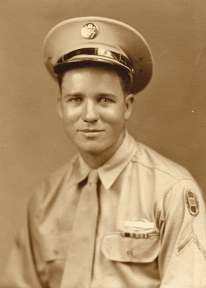
Claude Motley’s record from the Official Roster of South Carolina Servicemen and Servicewomen in World War II documents his brief participation in World War II. What it does not do is capture the details of this short but eventful period in Claude’s life on Earth. The record notes that he was born in Blaney (now Elgin), South Carolina on 1 November 1922. He still lived near Blaney when he entered active duty in the Army on 8 August 1944. He served overseas in the European-African-Middle Eastern Theater from 8 January 1945 until 12 June 1945. He was awarded the Good Conduct Medal, the Combat Infantryman Badge, the American Campaign Medal, the European-African-Middle Eastern Campaign Medal with service stars for the Rhineland Campaign and the Central Europe Campaign, and the World War II Victory Medal. He was honorably discharged as a corporal from Company M, 119th Infantry Regiment, 30th Infantry Division on 13 February 1946.
And now, the rest of the story: Claude enlisted in the Army on August 8th, 1944. Claude went to basic training at Camp Blanding near Starke, Florida and arrived on August 18th. He trained as a member of a heavy weapons company and trained on heavy infantry weapons, the heavy machine gun, the 81 millimeter mortar, the rifle, the carbine, the pistol, and grenades. Claude completed his training and moved to Fort Meade, Maryland to await transportation to Europe in early January of 1945. In Europe on January 8th, he was assigned to Company M, 119th Infantry Regiment, 30th Infantry Division. He was assigned to a machine gun platoon. When he joined the 30th Division, they were engaged in the final days of the Battle of the Bulge. On January 13th, the 30th Division launched a counteroffensive and began their push east toward Germany. On February 23rd, the 30th Division crossed the Roer River. On March 24th, they crossed the Rhine River in Germany. On April 12th, the 30thDivision reached the Elbe River forty miles Southwest of Berlin in eastern Germany. On April 13th, Company M crossed the Elbe River near Grunewalde. The Germans mounted a counterattack and captured 22 members of Company M including Claude, his Company Commander, Captain Romulus Mann, and his platoon sergeant, Technical Sergeant Paul Schreck, as they took cover in the basement of a farm house. Claude was imprisoned in Stalag IIIA near Luckenwalde, Germany. Like other prisoners at the end of the war, Claude suffered from poor nutrition and care. Rumor in Stalag IIIA was that the Russians were about to liberate the prisoners. Claude managed to get a map of Germany and he and a friend, Wilton Outlaw, escaped on May 5th. Their plan was to reach a crossroads and to use the map to find their way west to American lines. The plan hit a snag when they reached the first crossroads, because the Russians had come through the area and had changed all the road signs to Russian, which was unintelligible to Privates Motley and Outlaw. They revised their plan, put the map away, and simply headed west. They were given a ride for part of the way on a wood burning truck by people they could not communicate with. Claude returned to the 119th Infantry. Victory in Europe was achieved on May 8th when Germany surrendered. On 12 June, the 30th shipped back to the United States aboard the RMS Queen Mary ocean liner. After a visit home, Claude was stationed at Fort Lewis, Washington ,where he served as a driver until his discharge on February 13th, 1946.
Post war, Claude returned home and to logging and farming. He also taught agriculture in a veterans program for a couple of years. He raised a family, was active in his community and his church. He was truly one of America’s greatest generation.
—Submitted by his proud son-in-law, Nelson McLeod, Associate